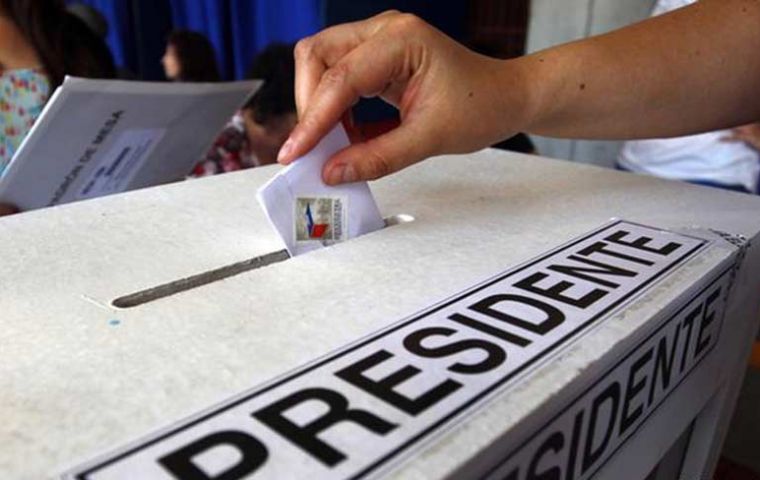MercoPress. South Atlantic News Agency
Chile: Far-left and far-right hopefuls poised to make it through to runoff in Sunday's presidential elections
 Polls in Chile have made huge miscalculations in recent elections, so anything can actually happen
Polls in Chile have made huge miscalculations in recent elections, so anything can actually happen Chile is electing its new President Sunday. But to be more accurate and since no candidate looks poised to a first-round victory, what the South American country is voting for is just the shortlist for Dec. 19's runoff.
Conservative (far right) candidate José Antonio Kast and leftwing hopeful Gabriel Boric have been pointed out by most polls to qualify for the decisive round, with at least half of the 15 million voters believed to be undecided and likely to sway in any direction, particularly after the social crisis of 2019 and the new Constitution being already drafted.
In this scenario, Chile is to choose between a “change of model” and the promise of “order and security”
According to the latest polls, Kast is favored to take first place Sunday with Boric not far behind, which means it could end up the other way around. After all, it would make no difference until December.
Christian Democratic candidate (center) Yasna Provoste is expected to come in third.
But Chile's polls have a recent history of gross miscalculations, dating back to the recent elections where members of the Constitutional Assembly were chosen. Therefore, these forecasts are not to be taken too seriously, particularly when some of the candidates, like Boric and Franco Parisi, have been kept away from campaigning due to positive COVID-19 tests which kept them under isolation over the past few days.
If in October 2019 social discontent exploded against a neoliberal model imposed by the military regime, the presidential campaign has brought to light the rise of a latent far right which Kast embodies as the true philosophical successor of former dictator Augusto Pinochet.
The alternative to Kast would be a much younger Boric from a coalition formed by Approve Dignity - Broad Front and the Communist Party.
Incumbent President Sebastián Piñera's own candidate - Sebastián Sichel - is heralded to end up in fourth place, although over 15 percentage points behind Provoste.
Since voting became no longer mandatory in Chile in 2012, turnout has fallen drastically below 50%. The legal change has led to the existence of three groups of citizens: those used to voting always, those from the younger generation who may or may not vote depending on who is on the menu, and those who just stay away from voting. Analysts believe that if the younger generations show up at polling stations, victory is Boric's. On the other hand, if they do not, Kast shall become president.
In addition to the President, Chileans will also vote Sunday for senators, deputies, as well as for regional councilors. The running presidential candidates have already overcome July 18's primary elections.
The list of candidates is as follows:
- Gabriel Boric (Broad Front for the I Approve Dignity pact)
- José Antonio Kast (Republicans for the Christian Social Front)
- Yasna Provoste (DC for New Social Pact)
- Sebastián Sichel (Independent for the Chile Podemos Más pact)
- Eduardo Artés (Patriotic Union)
- Marco Enriquez-Ominami (PRO)
- Franco Parisi (People's Party)
In order to be elected President, a candidate needs to garner an absolute majority of the votes. In the case of lawmakers, the D'Hondt system applies.
Kast has already run for La Moneda in 2017 when he got 7.93% of the votes. Among his proposals is the construction of ditches in the nothern border areas to prevent the passage of illegal migrants.




Top Comments
Disclaimer & comment rulesCommenting for this story is now closed.
If you have a Facebook account, become a fan and comment on our Facebook Page!